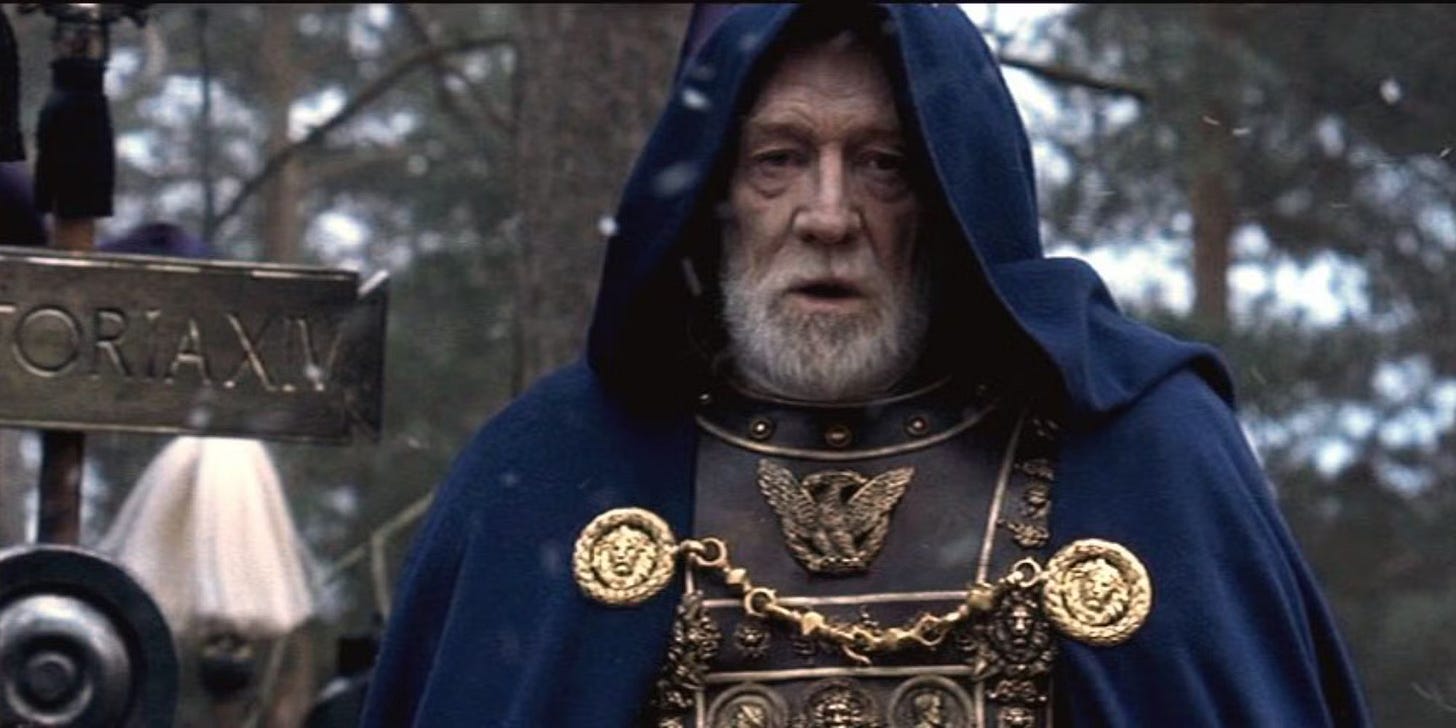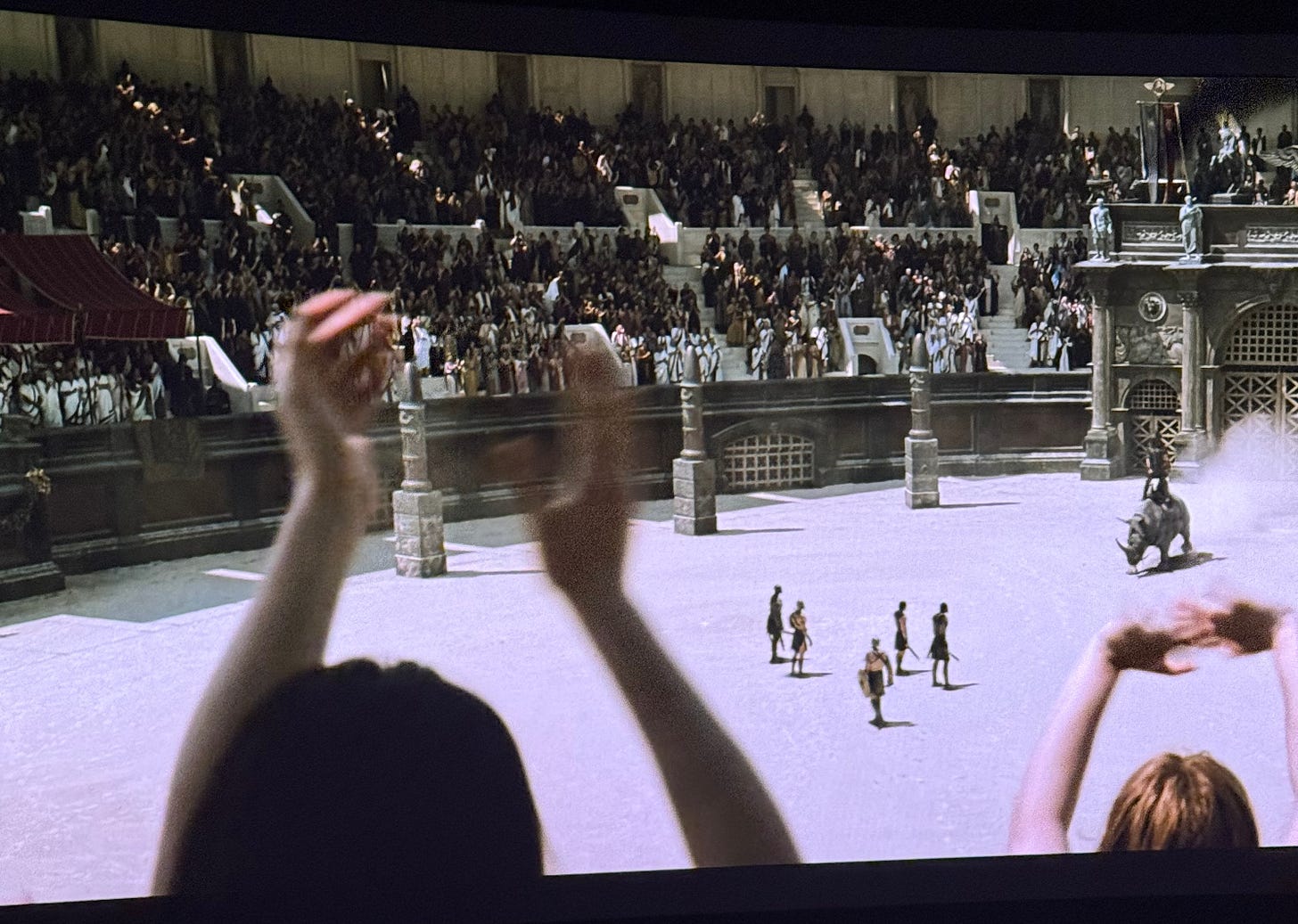advice from Marcus Aurelius for anyone disappointed by Gladiator 2
Were you among the many fans of the first Gladiator movie who found its long-awaited sequel… a little meh? Did you find it somehow both too gay in the wrong ways (queer-coded villains? groundbreaking. more like Gay-ta, am I right) and not gay enough (have Paul Mescal and Pedro Pascal kiss, cowards)? Did you struggle to suppress a chortle when Lucilla realizes Lucius must be her son because he quoted the most basic-bitch, widely known passage from the Aeneid? Were you kind of rooting for the anachronistic, ahistorical, and sadly underutilized CGI sharks?
Sarah Bond has already written about all of the ways in which Gladiator 2 distorts history to make it less interesting than it really was. So I’m not going to do that. Instead, I’m going to offer annoyed cinema-goers some advice from the best possible source, this guy:
The first Gladiator movie didn’t really get into Marcus Aurelius qua philosopher, unfortunately, but a significant part of his legacy has been his Meditations, a philosophical diary he wrote in Greek.
I dedicated an entire chapter of my book Not All Dead White Men to the topic of how gross, right-wing internet misogynists like to quote Meditations to feel rational and smart, and honestly, when someone tells me that they love the text a small chill runs down my spine. But the truth is, I love it too. There’s a lot of wisdom in there. Take this:
When you wake up in the morning, tell yourself: The people I deal with today will be meddling, ungrateful, arrogant, dishonest, jealous, and surly. They are like this because they can’t tell good from evil. (Meditations 2.1, trans. Hays)
What an absolutely solid piece of advice! The best possible advice for life, honestly — to remember to not stress about what isn’t in your control. Like, for example, the quality of a subpar sequel.
It’s this wisdom that can help us cope with the disappointment that is Gladiator 2.
Indifference to external events. And a commitment to justice in your own acts. Which means: thought and action resulting in the common good. What you were born to do. (9.31)
The true Stoic feels only indifference at movies that completely butcher ancient history, philosophy, literature, racial dynamics, gender roles… ok, I’m starting to worry that the length of this list is itself proof of my insufficiency as a Stoic.
Pointless bustling of processions, opera arias, herds of sheep and cattle, military exercises. A bone flung to pet poodles, a little food in the fish tank. The miserable servitude of ants, scampering of frightened mice, puppets jerked on strings. Surrounded as we are by all of this, we need to practice acceptance. Without disdain. But remembering that our own worth is measured by what we devote our energy to. (7.3)
As someone currently devoting her energy to using Stoic philosophy to dunk on a Hollywood film… you know what, I stand by my choices.
Choose not to be harmed—and you won’t feel harmed. Don’t feel harmed—and you haven’t been.
It can ruin your life only if it ruins your character. Otherwise it cannot harm you—inside or out. (4.7-8)
Don’t think of the three hours you spent in the movie theater (if you count the interminable pre-movie commercials and previews) as time wasted! Think of it as an opportunity to practice philosophy.
It’s unfortunate that this has happened. No. It’s fortunate that this has happened and I’ve remained unharmed by it—not shattered by the present or frightened of the future. It could have happened to anyone. But not everyone could have remained unharmed by it. Why treat the one as a misfortune rather than the other as fortunate? Can you really call something a misfortune that doesn’t violate human nature? Or do you think something that’s not against nature’s will can violate it? But you know what its will is. Does what’s happened keep you from acting with justice, generosity, self-control, sanity, prudence, honesty, humility, straightforwardness, and all the other qualities that allow a person’s nature to fulfill itself? So remember this principle when something threatens to cause you pain: the thing itself was no misfortune at all; to endure it and prevail is great good fortune. (4.49a)
Honestly, the makers of the film gave us all a gift! I definitely felt that joy when I witnessed this scene, where a dude rides a rhino between extremely phallic columns:
Human life. Duration: momentary. Nature: changeable. Perception: dim. Condition of body: decaying. Soul: spinning around. Fortune: unpredictable. Lasting Fame: uncertain. Sum Up: The body and its parts are a river, the soul a dream and mist, life is warfare and a journey far from home, lasting reputation is oblivion. Then what can guide us? Only philosophy. (2.17)
Ok, that one feels like kind of a bummer and maybe a little too much pressure. Moving on.
Forget everything else. Keep hold of this alone and remember it: Each of us lives only now, this brief instant. The rest has been lived already, or is impossible to see. The span we live is small—small as the corner of the earth in which we live it. Small as even the greatest renown, passed from mouth to mouth by short-lived stick figures, ignorant alike of themselves and those long dead. (3.10)
Also kind of a bummer, but this one I find kind of comforting, to be honest!
To shrug it all off and wipe it clean—every annoyance and distraction—and reach utter stillness. Child’s play. (5.2)
I do wonder if this guy ever met a child. Because my kids are pretty weak in the “shrugging it all off” department, and extremely weak in the “reaching utter stillness” department.
Leave other people’s mistakes where they lie. (9.20)
Some more excellent advice, which I guess I’m not taking because instead of letting Gladiator 2’s mistakes lie I wrote a newsletter piece about it. You know what, there’s a reason why someone studying stoicism is called a proficiscens (someone who is setting out on a journey). It’s ok to not be proficient yet.
And, the best advice of all:
The best revenge is not to be like that. (6.6)
I like this one so much that I might get a tattoo of it. (For those interested, the Greek is: Ἄριστος τρόπος τοῦ ἀμύνεσθαι τὸ μὴ ἐξομοιοῦσθαι.) Always remember that the best revenge is to study antiquity in a way that is thoughtful, well-researched, and critical — and most of all, with good humor, and without taking it or yourself too seriously.
I’m still rooting for the sharks, though. Even if they wouldn’t stand a chance against Roman dolphins.




